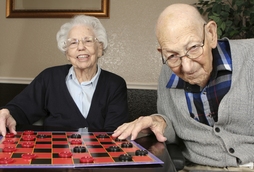New Alzheimer’s research being presented at international conference

Brain training exercises can help improve the cognitive function in older people with dementia, research by scientists in Japan has shown.
The scientists conducted two studies, one with 124 older adults living in the community and another with 32 people with Alzheimer’s disease living in a nursing home. In both studies, the participants were split into two groups. One group did regular brain training exercises which consisted of reading and arithmetic tasks five days a week for six months, whilst the other group received no brain training. According to the assessment which is called the frontal assessment battery (FAB), all those who did the brain training showed improvement in their cognitive function.
Two studies were conducted. One study involved 124 older adults living in the community, and another involved 32 people with Alzheimer’s disease living in a nursing home. In both studies participants were divided into two groups. One group took part in training, which consisted of reading and arithmetic tasks for approximately five days a week for six months. The other group received no training. According to an assessment called the frontal assessment battery (FAB), all those undertaking the training showed improvement in their cognitive function.
Dr Anne Corbett, research manager from the Alzheimer’s Society said: ‘This research is some of the first to test whether brain training can have cognitive benefits for older people. The results are promising but more research is required in larger numbers of people and we need to see if it has benefits for everyday life. This research also only looked at one very specific programme. Alzheimer’s Society is currently carrying out its own research to find out if brain training could improve brain function in the over 60s and therefore help slow the progression of dementia or stop it developing in the first place.
‘We know the best way to reduce your risk of dementia is by staying active and eating a balanced diet as well as watching your blood pressure and cholesterol and not smoking.’
New research has also shown that activity-based therapies and care can reduce the use of antipsychotic drugs for people with dementia. A study carried out by University of North Carolina looked at 107 people with dementia and monitored their agitation and apathy levels along with physical and cognitive function and leisure interests. Activity based therapies were then prescribed to those suffering agitation, or to alert those with apathy at the time of day that they were most likely to experience behavioural symptoms.
Carried out over two weeks, the study showed participants with limited activity participation were found to be much more likely to demonstrate apathy, agitation, or a mix of apathy and agitation.
Dr Anne Corbett, research manager from the Alzheimer’s Society said: ‘This research highlights the importance of good quality care for people with dementia as well as engaging them in stimulating activities. This adds to a wealth of evidence showing a lot can be done, without the use of medication, to help reduce agitation of a person with dementia. It is estimated that 150,000 of the 180,000 people on antipsychotics are prescribed them inappropriately. These drugs double the risk of death and treble the risk of stroke yet have little benefit. It is essential we bring an end to this chemical cosh now.
‘It is vital to provide care staff and doctors with advice, guidance and training on alternative approaches to help them to avoid the use of antipsychotics. In particular, it is important for them to see the person behind the condition and understand what is causing their behaviour.’
The findings of both studies will be presented today (Friday 9 March) at the Alzheimer’s Disease International conference in London.
Latest News
 29-Jul-24
Dementia Bus gives carehome.co.uk staff insight into life with dementia
29-Jul-24
Dementia Bus gives carehome.co.uk staff insight into life with dementia
 27-Jul-23
UK's top home care agencies in 2023 revealed
27-Jul-23
UK's top home care agencies in 2023 revealed
 30-Nov-22
A quarter of older people keep their falls secret from family
30-Nov-22
A quarter of older people keep their falls secret from family
 29-Nov-22
'Covid-19 has not gone away' say terminally ill
29-Nov-22
'Covid-19 has not gone away' say terminally ill
 28-Nov-22
IT consultant who received poor care opens 'compassionate' home care business
28-Nov-22
IT consultant who received poor care opens 'compassionate' home care business